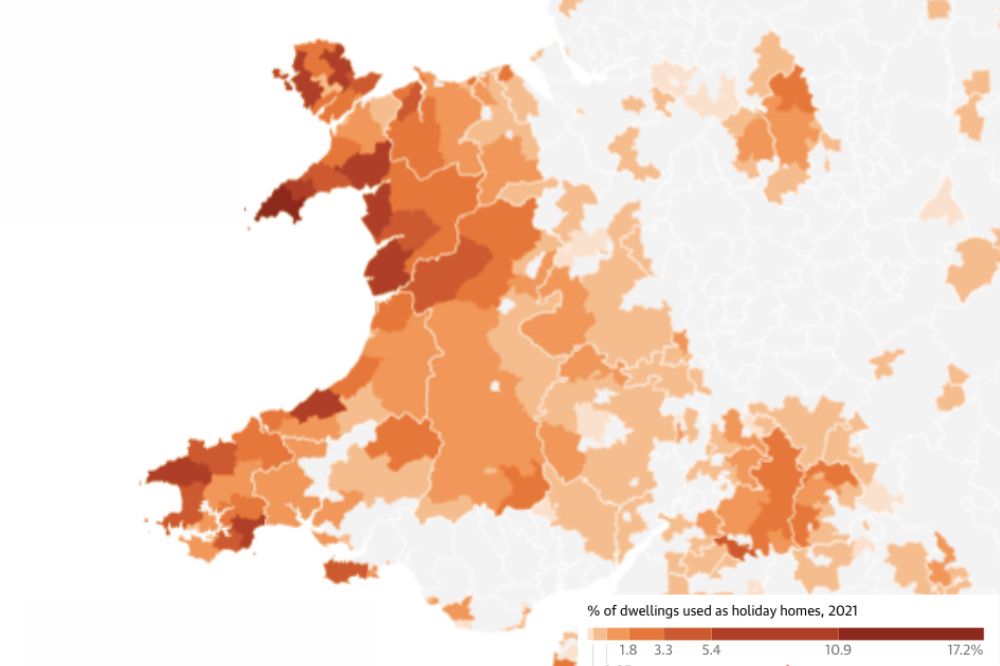Council expected to approve measure to limit second homes

A Welsh council is expected to approve measures to limit second homes and holiday accommodation to address the housing crisis, according to Welsh language campaigners.
Cymdeithas yr Iaith expect Cyngor Gwynedd’s Cabinet to approve the introduction of an Article 4 Direction across the county, which would limit second homes and holiday accommodation.
There are now calls for other councils to follow Gwynedd’s example and for the Welsh Government to support these councils.
Powers
As part of a package of measures introduced in 2021 intended to alleviate the housing crisis in Wales, the Welsh Government gave local planning authorities the power to introduce an Article 4 Direction, which would make planning permission mandatory before turning a permanent home into a second home or holiday accommodation.
Following a consultation process, Cyngor Gwynedd’s Cabinet will make a final decision on the introduction of their Article 4 Direction next Tuesday (16 July). If passed, Cyngor Gwynedd would be the first local authority in Wales to pass the policy.

In a Justification Report presented to the Council at the start of the consultation process, reference was made to research which showed that 65.5% of the county’s population could not afford to live in it, and that measures introduced so far – such as increasing premium council tax on second homes – were not enough on their own.
Population decrease
According to the figures of the last Census, the population of Gwynedd fell by 3.7%, and the proportion that spoke Welsh by 1%.
In an open letter from the Chair of Cymdeithas yr Iaith’s Gwynedd and Môn Region, Gwyn Siôn Ifan, to Cyngor Gwynedd’s Cabinet, he said that the authority would be “expected” to “use all the powers available to you to tackle the housing crisis, in this case, by introducing an Article 4 Direction across the county.”
He also says that it is key that Cyngor Gwynedd continues with the policy in order to “show leadership” and “give guidance to the rest of Wales.”
Several other local authorities have delayed introducing similar measures. One of these is Conwy Council, who referred in April to staffing and cost challenges as a reason not to continue with the policy.
Ceredigion Council has said that it is necessary to see how the process operates in Gwynedd before starting it there; while Eryri National Park has prioritised work on submitting an Article 4 Direction for the Local Development Plan in the park area.
Calls
Cymdeithas yr Iaith has called several times on the Welsh Government to provide support and guidance to Local Authorities to introduce an Article 4 Direction, and has now reiterated that call.

Dr Jeff Smith, Chair of the Cymdeithas yr Iaith Sustainable Communities Group, said: “We are pleased to see Gwynedd Council proceeding with the process of introducing an Article 4 Direction across the whole county, but the housing crisis in Wales exists beyond the borders of Gwynedd.
“We are now calling on other local authorities to follow this example across their counties.
“It is evident that financial considerations, administrative capacity and uncertainty about the process have prevented them from proceeding, so the Welsh Government has a duty to prepare a support package that includes funding for additional staff in order to administer it along with clear guidelines.
“What is the purpose of these new powers if local authorities cannot make use of them due to a lack of resources or leadership?”
Support our Nation today
For the price of a cup of coffee a month you can help us create an independent, not-for-profit, national news service for the people of Wales, by the people of Wales.






Practical common sense at last. The whole UK needs to audit empty houses for whatever reason and as well as building purchase and renovation would create houses useable by housing associations and local authorities.
Whats that, premiums on second homes alone do not increase affordability, I am stunned. I noticed that Cymdeithas yr Iaith has a property act on their website which included rent controls for private landlords. Since we have the party of Wales demanding ‘fairness’, maybe Cymdeithas yr Iaith could ask a number of important questions.
One what is the nature of the leaders ‘investment property’.
Two is it a second home.
Three if it is a long term rental, is he charging the tenants ‘fair’ rents.
Premiums on second homes will reduce the number of properties being used as second homes, returning the rest to use as main residences. If supply increases while demand remains the same then prices will be more affordable. Rent controls on the other hand are a bad idea if it means the permitted rent cannot cover the cost of a landlord’s mortgage as this will reduce the supply of rental properties pushing up prices. Landlords aren’t optional – someone has to own a rental property. A better way for the state to moderate rent is for councils to buy and build… Read more »
Firstly I am in complete agreeing with you in regards to your second paragraph. It is incredible to read online commenters never seeming to understand this.
I am slightly sceptical if councils have the funds to not only buy and build properties, but to buy and build enough to make a difference.
The problem with second homes is that a number of them are simply unaffordable to most people. If the owner decides to sell up due to the premium of any other reasons what is the likelihood that the property will be purchased by a local buyer?
Spot on. Additionally, I understood that the rationale for introducing the second home premium was that there would be incremental income that could be used to build affordable housing- really ? Not the case in Ceredigion – I conducted extensive research and I have proved to the council and also to the Auditor General of Wales that their numbers are not correct. Since its introduction, there has been a net reduction in revenue ( I will not bore you with the details). Given the Welsh Assembly government announced incremental revenues of £17m for 2022/ 23, the Conservatives made a statement… Read more »
Second home levies won’t eliminate second homes. But they’ll reduce the number of ordinary family homes being used as second homes because someone who has a 3-bed semi for occasional use is more likely to find the levy unaffordable than someone with a six-bed detached. So that alone is worth the policy because ordinarily family homes being taken out of use as a main residence is surely worse for the local community than a clifftop mansion being used in this way For the properties at the higher end, there will still be some movement up the ladder as GPs, headteachers… Read more »
First paragraph – too simplistic. You really think there will be a property crash that will sufficiently enable those people to be able to afford those properties ? Incidentally, you may then also have negative equity as an unwelcome consequence. The main issue I suggest is that rural Wales is becoming poorer year on year due to a dearth of well paid jobs. The public sector workforce is in decline and any existing private sector jobs are generally poorly paid. Our brightest and best simply move away in search of opportunities elsewhere, many understandably not returning.
I totally agree, the issue of second homes is about the creation of better paid jobs.
If your argument that increasing supply causes a property crash is correct then we shouldn’t build new properties. Returning a second home to main residence use is no different to building a new property next door in terms of how the market responds.
Paradoxically, you may find that prices for second homes actually go up ! Limited supply.
Ardderchog Gwynedd, leading the way again. More to follow please!
The ban on squatting of residential homes could be lifted so that locals can take over the use of empty second homes.
Hope this will apply to all those party houses on AirBnB and similar.